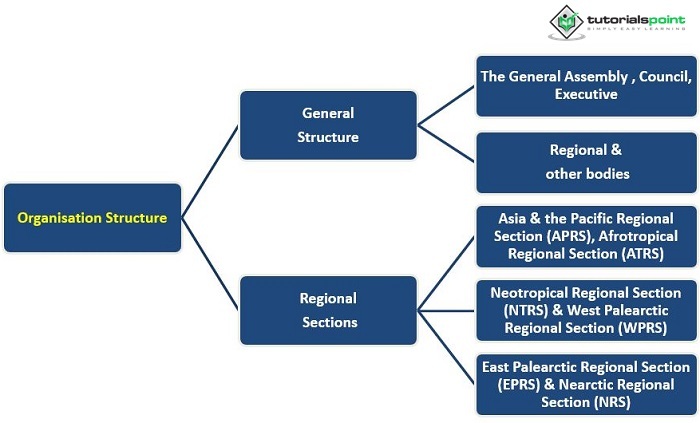
 Data Structure
Data Structure Networking
Networking RDBMS
RDBMS Operating System
Operating System Java
Java MS Excel
MS Excel iOS
iOS HTML
HTML CSS
CSS Android
Android Python
Python C Programming
C Programming C++
C++ C#
C# MongoDB
MongoDB MySQL
MySQL Javascript
Javascript PHP
PHPPhysics
Chemistry
Biology
Mathematics
English
Economics
Psychology
Social Studies
Fashion Studies
Legal Studies
- Selected Reading
- UPSC IAS Exams Notes
- Developer's Best Practices
- Questions and Answers
- Effective Resume Writing
- HR Interview Questions
- Computer Glossary
- Who is Who
International Organization for Biological Control (IOBC)
In response to the growing need for a coordinated campaign to promote the use of biological control, the IOBC was established in Europe in 1955. The organization was initially established by a group of European entomologists with the aim of using natural enemies to control weeds and insect pests in agricultural and horticultural crops as well as to create a more effective and environmentally friendly approach to pest management.
The scope of IOBC has evolved over time to cover other pest management sciences like invasive species, urban pests, and forest pests. As a result of the growing interest in biological control around the world, the IOBC has also increased the diversity of its membership.
Objectives of IOBC
The IOBC endeavors to accomplish a range of objectives. These involve −
To advance scientific investigation and development in the area of biological control − The IOBC seeks to promote both the advancement of current biological control techniques and the creation of new ones.
To encourage the use of biological control agents in pest management − The IOBC promotes the use of biological control methods in the management of pests and works to increase awareness and understanding of biological control among farmers, foresters, and other stakeholders.
To provide a forum for scientists, practitioners, and other stakeholders to exchange information and ideas − The IOBC encourages cooperation and communication between individuals and Organizations engaged in biological control.
To promote environmentally friendly forestry and agriculture practices that minimize the use of chemical pesticides − The IOBC promotes environmentally sustainable pest management practices in order to reduce reliance on chemical pesticides, which can be harmful to both human health and the environment.
Functions of the IOBC
The following functions are provided by Article II of the Statutes of the International Organization for Biological Control (IOBC Global) −
Promote the use of biological control in integrated control programmes, the advancement of this technology, and international cooperation in achieving these objectives.
Collect, assess, and disseminate information about biological control;
Encourage public awareness of the economic and social importance of biological control, as well as national and international efforts to advance personnel research and training, large-scale application coordination, and public awareness of the importance of biological control;
Plan conferences, meetings, symposia, and any other necessary activities to advance the organization's overall objectives.
The Organization may consult, collaborate, or reach agreements with national or international governmental or non-governmental organizations.
Organizational Structure
The IOBC is a decentralized organization, comprising working groups and regional sections. These organizations concentrate on particular biological control issues like integrated pest management, biological control of invasive species, and biological control in conservation. Each group has a coordinator who is in charge of organizing activities and encouraging participant communication.
The IOBC is governed by an executive council composed of the president, vice-president, secretary-general, and treasurer. The council is in charge of making decisions about budgets, scheduling conferences and meetings, and establishing policies. It is also responsible for the overall direction of the organization.

Membership of the Organization
The Membership of the Organization is outlined in Article III of the Statutes of the International Organization for Biological Control (IOBC Global). According to this article, membership is accessible to individuals and Organizations (public or private) who want to advance the objectives of the Organization.
Membership is categorized into four groups −
Individual Members − Individual membership is available to anyone involved or interested in biological control.
Institutional Members − Any Organization involved in biological control activities, such as governmental Organizations, scientific academies, universities, institutes, and societies, is eligible to join as an institutional member.
Supporting Members − Supporting membership is open to anyone who is interested in advancing the objectives of the organization.
Honorary Members − The Council may grant honorary membership to those who have made outstanding contributions to biological control.
Activities of the Organization
The IOBC is involved in a variety of activities aimed at promoting the use of biological control. Research, training, education, and advocacy are among these activities. The IOBC's primary activities include the following −
Research − By providing financial support, networking opportunities, and technical assistance to researchers studying biological control, the IOBC promotes research on biological control. In order to disseminate research findings and foster scientific exchange among researchers, the Organization also publishes scientific journals, books, and newsletters.
Training and Education − The Organization supports scientific symposiums, workshops, and meetings on a range of biological control-related subjects. These events give researchers and practitioners the chance to exchange experiences and knowledge, discuss contemporary affairs, and create collaborative research projects. In addition, IOBC publishes numerous scientific books, journals, and newsletters. The journals include BioControl, a top publication on biological control, and Bulletin of IOBC/WPRS, a publication that describes the activities and events of the Organization. The IOBC publications are highly regarded for their caliber and relevance to the field of biological control.
Advocacy − The IOBC promotes biological control as a successful and long-term pest management strategy. The Organization collaborates with policymakers, executive branch Organizations, and other stakeholders to promote the passage of biological control laws and policies.
Contributions to Pest Management − IOBC has significantly influenced the creation and application of biological control techniques in pest management. In addition to managing weeds and insects, the Organization has played a significant role in advocating the use of natural enemies to manage other pests, such as invasive species and plant pathogens.
Conclusion
The IOBC is instrumental in promoting the use of biological control techniques as a viable and efficient alternative to chemical pesticides for pest management. The Organization has supported studies on the biology, ecology, and behavior of natural enemies as well as studies on the interactions between natural enemies and the pests that serve as their hosts.
From its activities and achievements, biological control techniques have advanced and received a significant global promotion. Overall, the IOBC plays a critical role in promoting the use of biological control methods as an effective alternative to chemical pesticides in pest management.
Frequently Asked Questions
Q1. What is biological control?
Ans. The use of living organisms or their products to prevent or reduce losses or harm caused by pest organisms is referred to as biological control.
Q2. What is the main objective of the IOBC?
Ans. The main objective of the IOBC is to encourage the use of biological control agents in pest management and to advance scientific investigation and development in the area of biological control.
Q3. How many types of membership are provided by the organization?
Ans. Membership is categorized into four groups which include Individual Members, Institutional Members, Supporting Members and Honorary Members.

